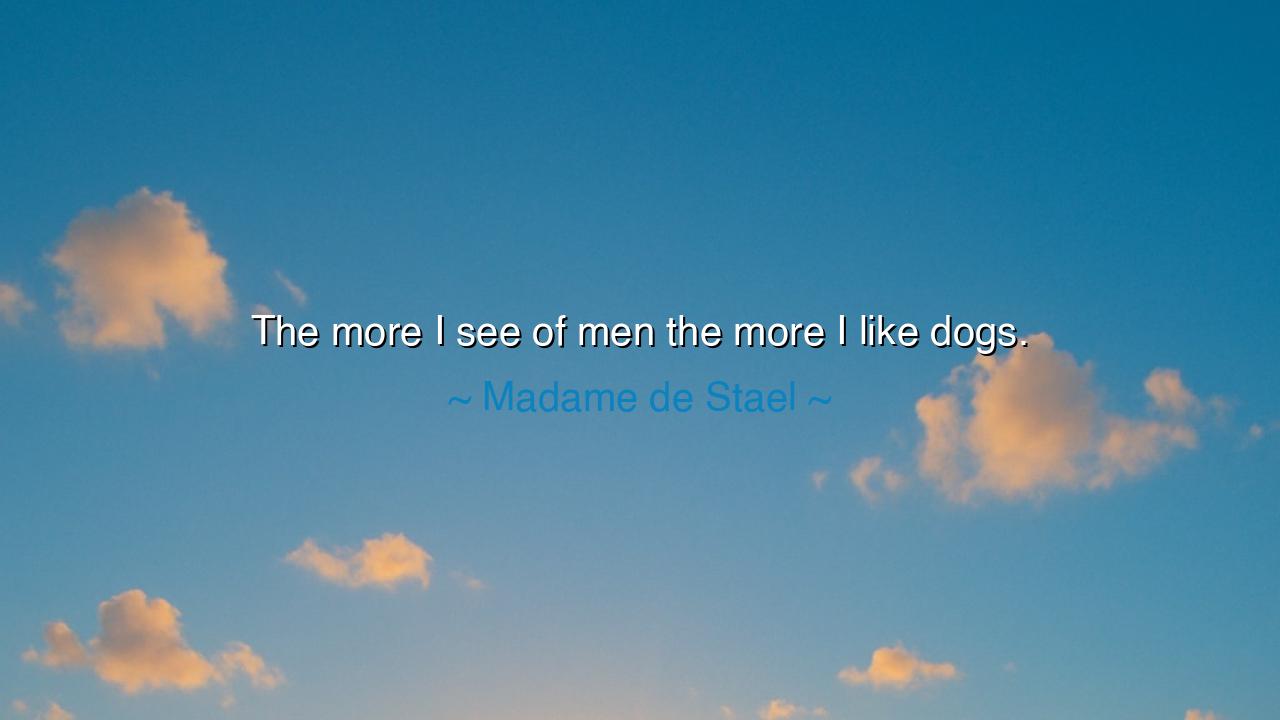
The more I see of men the more I like dogs.






Listen, O children of wisdom, to the words of Madame de Stael, whose reflection on the nature of human beings and the simple purity of animals strikes at the heart of our shared humanity. She spoke thus: "The more I see of men the more I like dogs." These words, though seemingly lighthearted, carry with them a profound commentary on human nature, loyalty, and the inherent flaws that often accompany the human condition. Madame de Stael, a brilliant mind of the Enlightenment, was acutely aware of the complexities of human behavior—the contradictions, the pretensions, and the insecurities that often plague men and women alike.
At the core of Madame de Stael’s statement lies the idea that humans, with all their intellect and ambition, often fall prey to vanity, deception, and self-interest, while the dog, though less intellectually complex, embodies a form of pure loyalty, honesty, and uncomplicated affection. Dogs, unlike humans, do not scheme or betray. They do not conceal their emotions behind masks of social expectation or artifice. In this way, they present an ideal of simplicity and authenticity that, in contrast, often seems missing in the complex, ever-shifting world of human relationships. The dog offers companionship without condition, a trait that Madame de Stael found to be far more reliable than the fickle nature of men.
Consider, O children, the ancient Greek view of animals, where creatures like the dog were held in high esteem for their qualities of loyalty and courage. The dog, in the eyes of the Greeks, was a faithful companion in the battlefields and in the home. The philosopher Plato himself spoke of the virtues of loyalty and trustworthiness, traits that were embodied in the humble dog. In a world filled with treachery and shifting alliances, the dog remained a constant—a creature whose devotion could be counted on, regardless of the circumstances.
Yet, men—with all their greatness and wisdom—often fall short of the simple virtues displayed by the dog. Human history is filled with stories of betrayal, ambition, and greed. Consider, O children, the tale of Julius Caesar, whose closest friend, Brutus, betrayed him in the Senate, leading to Caesar's assassination. The betrayal of trust, in this case, echoes through the ages as a reminder that even those closest to us may act out of self-interest, shattering the bonds that tie us. In contrast, the dog’s loyalty remains unwavering, not dependent on personal gain but on a deeper sense of affection and fidelity.
Madame de Stael’s words also speak to a broader truth about the nature of humanity. We are often trapped in our own complexities, our minds consumed with doubt, ambition, and the fear of being misunderstood. Men and women continually struggle to reconcile their desires with their actions, their inner selves with the expectations of society. The dog, on the other hand, has no such contradictions. Its actions align perfectly with its nature: a desire for companionship, affection, and loyalty. The dog’s world is simpler, and perhaps in that simplicity, there is a profound peace that humans often seek but rarely find.
The lesson here, O children, is one of simplicity, loyalty, and authenticity. While humanity’s complexity can be a source of great achievement, it is also a source of confusion and discord. Let us look to the example of the dog, not in a literal sense, but as a reminder of the qualities we should strive to embody: unconditional loyalty, honesty, and a life lived without pretense. Just as the dog offers its affection without question, so too should we seek to give of ourselves without the shackles of selfish desire or complex motives. In doing so, we will find a truer, more meaningful connection with those around us.
And so, O children, let us learn from the words of Madame de Stael and the nature of the dog. In a world often clouded by deception and doubt, let us choose to live with the same simplicity and loyalty that the dog exemplifies. Let us be honest in our affections, pure in our intentions, and steadfast in our commitments, knowing that in doing so, we embody the virtues that can create deep, lasting bonds in our relationships and in our communities. May we all strive for that purity of heart, and, in turn, may we bring greater harmony to the world.






AAdministratorAdministrator
Welcome, honored guests. Please leave a comment, we will respond soon